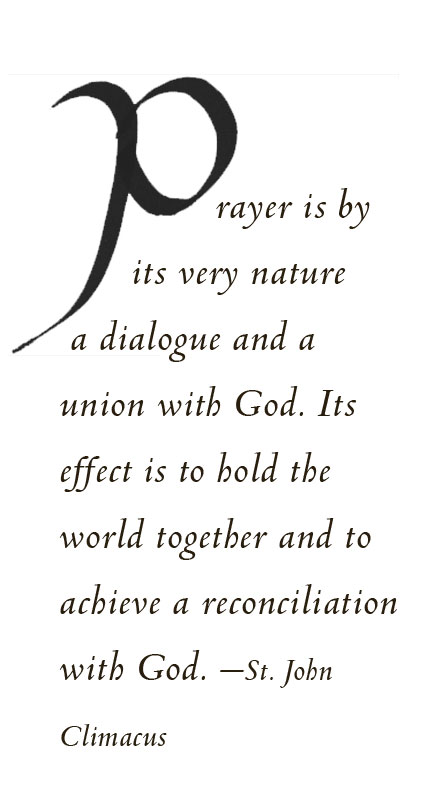Prayer and the Presence of God
In our fragmented world, the need for prayer is apparent. The insatiable thirst for wealth, pleasure and unfulfilling happiness, the violence and disregard for human life: all this is little different from St. Benedict’s day. He fled the corrupt student milieu of Rome, and his life thereafter was an ever increasing journey into the life of Christ: first in the solitude of the hermit life, and then in community, where Christ was recognized in the voice of God speaking through the Scriptures, the liturgy, the abbot and one’s brethren, the guests. In short, through all creation Christ speaks to us. Christ is forever the model for monastic life, for He died out of love—not love for himself, but for the world, and the monastery has been, is now, and forever shall be, “a school for the Lord’s service,” devoted to the peace of all the world, inspired by our Lord’s summons that “Whosoever will come after me, let him deny himself, and take up his cross, and follow me.” (Mk 8:34).
This voice of God and our response to him is what constitutes prayer: a loving dialogue between Creator and creature. The Benedictine enters the monastery, St. Benedict’s “school for the Lord’s service” in order to learn to hear this voice and respond to it, much as a person enters into marriage in order to live and grow together with the partner for the rest of their lives. Prayer fills our whole life; it penetrates every corner of the day and night, as we seek to be aware of God’s presence and live in it.
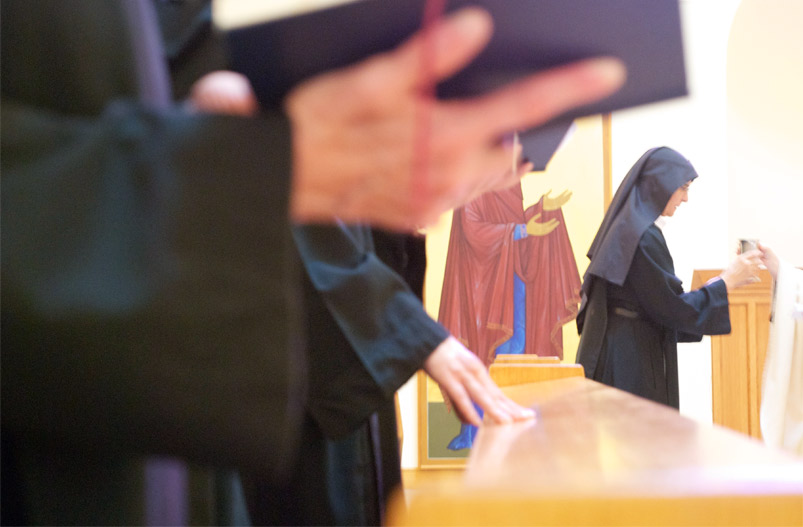
Liturgy
The celebration of the liturgy – the Mass, or Eucharist, and the Divine Office – is the principal work of the nun and monk: “Let nothing be preferred to the Work of God,” St. Benedict says in his Rule. The rhythm of daily prayer and the yearly liturgical cycle consecrates all human time by immersing us in the celebration of Christ’s life and the life of the church; we on earth share in Christ’s prayer. We enter into his very prayer, singing the Father’s praises and interceding for the world. The monastic choir is a reflection of the monastic community itself, and of the church at large: individual voices, each with its particular quality created by God, praising God in the unity of community.
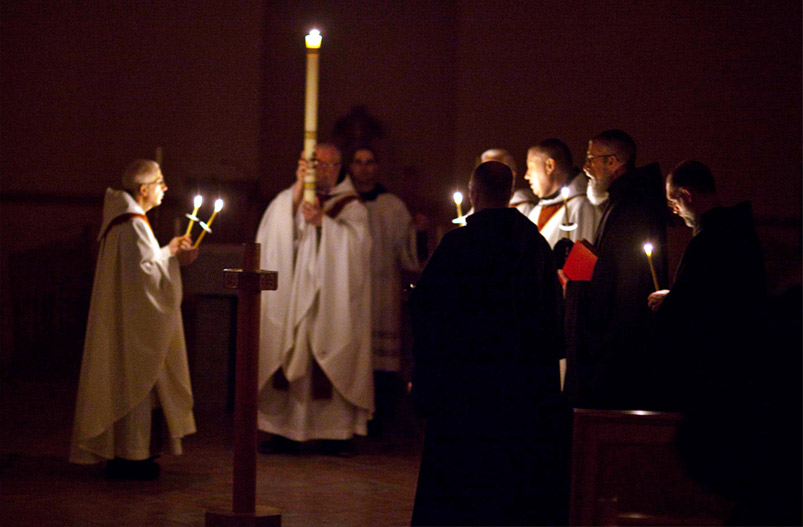
Opus Dei
The Divine Office, St. Benedict’s Opus Dei, or Work of God is formal, vocal prayer sung at intervals throughout the day and night. Its purpose is to extend the Paschal Mystery of the Eucharist throughout the day. Comprised chiefly of the psalms, a scripture reading, hymn and prayer, it is the center of life in all Benedictine monasteries. Seven times a day the community gathers, leaving immediately whatever occupies them at the moment, to sing this prayer to, and praising of, Almighty God. It is the heartbeat of monastic life: even when the chant has ended, it continues in the hearts and souls of monks and nuns, infusing their silent prayer, their lectio divina, or sacred reading, their manual and intellectual work.
Our lives are dominated by the Divine Office: from the first Domine, labia mea aperies, “O Lord, open my lips,” to the nightly closing Marian antiphon and blessing with holy water by the superior, the unceasing round of the Work of God sanctifies the day and night and consecrates to God the individual monk or nun, the community, and, in a mysterious way, the entire world.
The services of St. Scholastica Priory are sung in Latin using Gregorian chant. This ancient Latin music provides a rich repertoire, using sacred texts taken mainly from the Bible. Gregorian chant has been called the “Word of God made music,” for the integral linking of melody to text illuminates the meaning of the sacred word, interprets it and helps the hearer assimilate it.
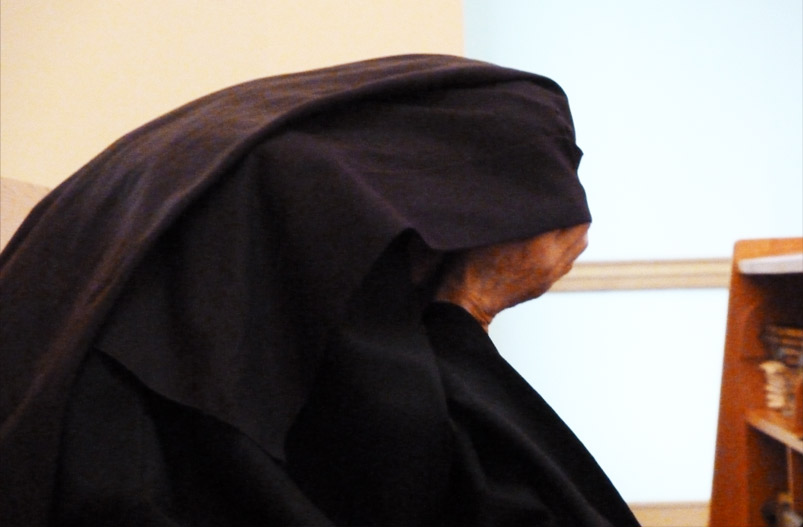
Lectio Divina
In an address he gave in 2005, Pope Benedict XVI said, “I would like in particular to recall and recommend the ancient tradition of Lectio divina: the diligent reading of Sacred Scripture accompanied by prayer brings about that intimate dialogue in which the person reading hears God who is speaking, and in praying, responds to him with trusting openness of heart.”1
In St. Benedict’s Rule, between two to three hours a day are devoted to lectio divina, “sacred reading” or “holy reading.” This ancient practice, originally practiced by all Christians, involves the slow, meditative reading of Holy Scripture primarily. Far from speed-reading and computer-generated fact gathering, lectio is a slow process intended to open our hearts to God’s Word. By reading a passage of Scripture and meditating upon, we enter into a dialogue with God and, finally, quietly and trustingly rest in his presence.
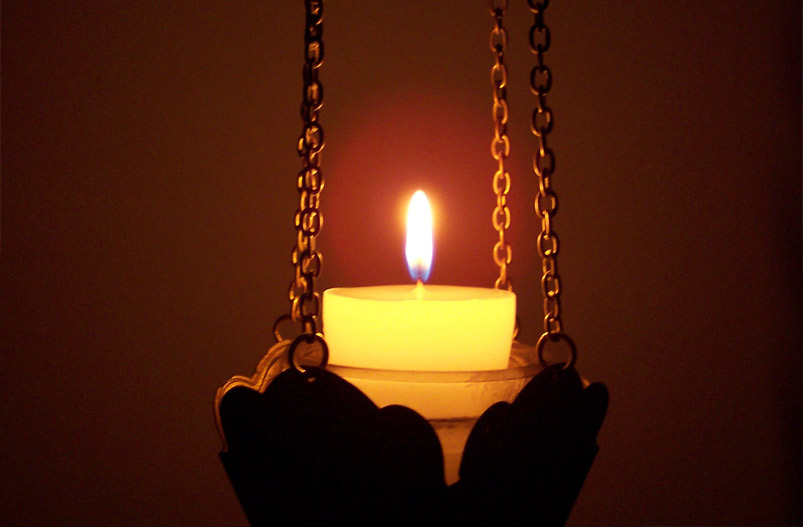
1 Address of His Holiness Benedict XVI to the Participants in the International Congress Organized to Commemorate the 40th Anniversary of the Dogmatic Constitution on Divine Revelation Dei Verbum,” Castel Gandolfo, September 16, 2005.
Pope Benedict XVI on Dei Verbum
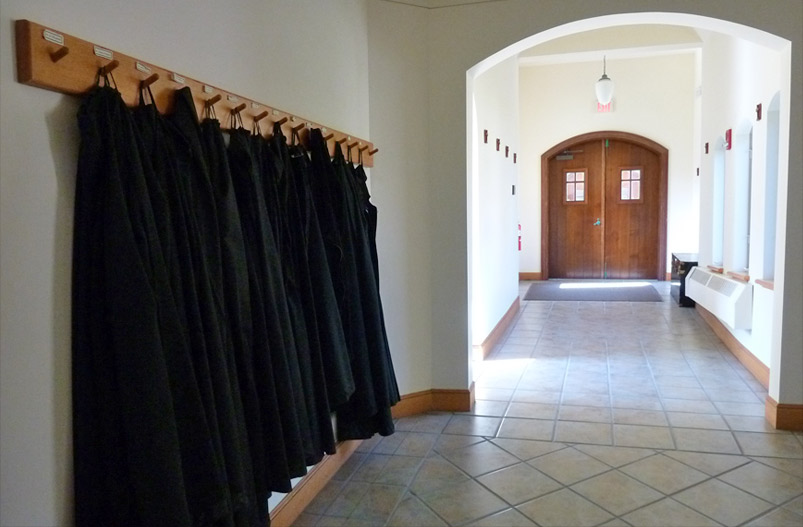
LINKS
- Divine Office:
- The Liturgy of the Hours A concise introduction to the Divine Office from the USCCB.
- Universalis A resource for celebrating the Divine Office.
- Lectio Divina:
- Accepting the Embrace of God: the Ancient Art of Lectio Divina, by Fr. Luke Dysinger, O.S.B.
FURTHER READING
- Gregorian chant:
- Robert M. Fowells, Chant Made Simple (Brewster, Massachusetts: Paraclete Press, 2000).
- William Tortolano, A Gregorian Chant Handbook (Chicago : GIA Publications, 2005).
- Lectio Divina:
- Michael Casey, OCSO, Sacred Reading: The Ancient Art of Lectio Divina (Ligouri, Missouri: Ligouri Publications, 1996).
- Mariano Magrassi, OSB, Praying the Bible: An Introduction to Lectio Divina (Collegeville: Liturgical Press, 1998).

